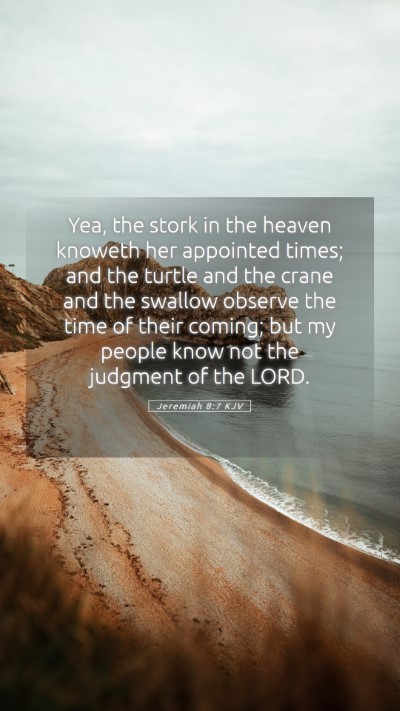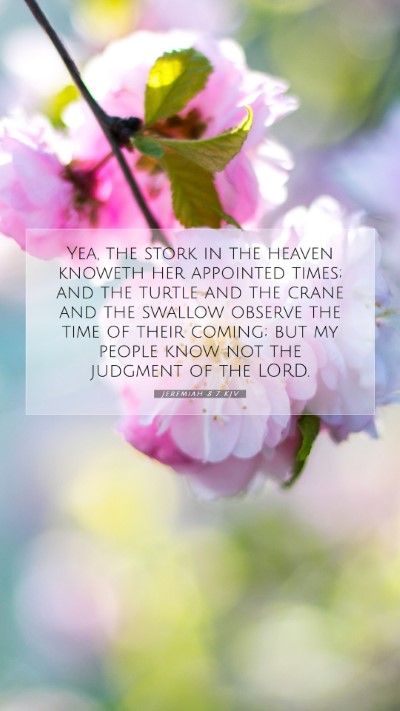Understanding Jeremiah 8:7: Insights and Exegesis
Jeremiah 8:7 states, "Yea, the stork in the heaven knoweth her appointed times; and the turtle and the crane and the swallow observe the time of their coming; but my people know not the judgment of the LORD."
This verse utilizes the imagery of migratory birds to illustrate a profound spiritual truth. In this analysis, we explore the various dimensions of its meaning, drawing from the insights of public domain commentaries, including those by Matthew Henry, Albert Barnes, and Adam Clarke.
Contextual Background
The book of Jeremiah is both a prophetic call and a lamentation over the sins of Israel. Jeremiah, often referred to as the "weeping prophet," voices God’s concerns regarding the people's disobedience and failure to repent. His words convey a sense of urgency as he calls the nation back to righteousness.
Verse Meaning: Key Insights
-
Symbolism of the Birds:
The use of birds such as the stork, turtle, crane, and swallow is not incidental. According to Matthew Henry, these creatures possess an innate understanding of their seasons and migrations, a wisdom that contrasts sharply with Israel's ignorance of God's divine timing and judgments.
Albert Barnes notes that the observational skills of these animals serve as a rebuke to humanity, emphasizing that while nature responds to God's order, the people fail to discern His commands.
-
Judgment and Understanding:
The phrase "know not the judgment of the LORD" indicates a grave spiritual apathy. Adam Clarke elaborates that this ignorance is not merely a lack of knowledge; it reflects a deeper moral and spiritual failure. The people of Israel, despite the warnings and signs, are blind to their consequences.
-
The Role of Prophets:
Jeremiah’s role as a prophet amplifies the urgency of the message. His lamentation over the people's ignorance is a call to recognize their rebellion against God’s laws. As Matthew Henry articulates, the ignorance is compounded by the sins that puff up their hearts and lead them away from righteous living.
Application and Relevance
The relevance of Jeremiah 8:7 transcends its historical context. For modern readers seeking Bible verse meanings and explanations, this verse serves as a poignant reminder of the necessity for spiritual vigilance.
Understanding Scripture through the lens of this passage invites us to reflect on our own awareness of God's presence and the implications of His judgments in current times.
Cross References
- Isaiah 1:3 - "The ox knoweth his owner, and the ass his master's crib: but Israel doth not know, my people doth not consider."
- Hosea 4:6 - "My people are destroyed for lack of knowledge: because thou hast rejected knowledge, I will also reject thee."
- Proverbs 1:28-29 - "Then shall they call upon me, but I will not answer; they shall seek me early, but they shall not find me: For that they hated knowledge, and did not choose the fear of the LORD."
Conclusion
In summary, Jeremiah 8:7 provides rich Bible study insights revealing the contrast between nature’s awareness and humanity's ignorance. In examining the meaning of Bible verses like this, we gain insights not only into the historical context of Israel but also into our own spiritual lives. Emphasizing the importance of Bible study groups and online Bible study resources can foster a deeper understanding of such profound teachings.


